Robbie Britton
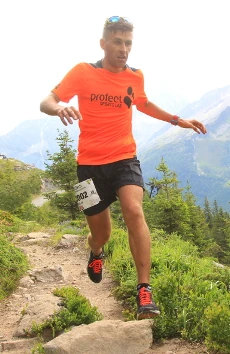
Robbie Britton is a GB ultra runner from Kent, currently living and training in Chamonix, France.
He's also a coach and writes regularly for publications such as The Guardian and Men's Running.
Robbie's ranked third in the world for 24-hour ultra marathon running.
We discussed injuries, 24-hour track races, the importance of planning, what people get wrong, and the pain of... 800m running.
The Interview
We spoke to Robbie in December 2016
rb: Dare we ask how you're getting on with training? How's the knee?
rb: Yeah, I had knee surgery about eight weeks ago so right now it's just 20 minutes running a day.
The problem I had stemmed from an old American Football injury. I had a torn cartilage when I was 18 and it took a few years to get that sorted. The main issue is I didn't do a very good job of the rehab. At the time I wasn't a runner, I just wanted to get back out and play football, so I think I was back out playing within a month.
But now I'm being careful. I think my first run back was 4 x 2 minutes with a two-minute walk, and I've just been building up from there. In a couple of weeks I built up to 20 minute runs, nice and easy. This weekend I'm doing a flat 7k XC race in Switzerland
rb: So have you got a plan or is it just a case of taking each day as it comes?
bp: I'm working with a physio who's a friend of ours, Sarah Tunstall. She's been helping the whole way through. We're doing a lot of core work, a lot of strengthening around the knee and a lot of work on stabilising muscles and balance.
I ran 30 minutes one day and it was just a bit much for me, so we dropped it back down again. It's really been about seeing what the knee can cope with.
It's very much a flexible, dynamic plan, because the knee is boss at the moment. He decides what goes and what doesn't
Yeah, I could rush it and maybe get a week back earlier; but on the other hand if it goes wrong I could end up having to take a year out of my running career.
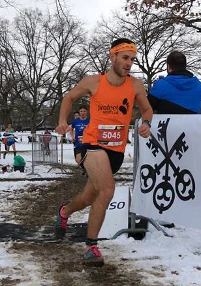
rb: Has the injury upset plans for this year?
bp: Well, the plan was to take it easy for a couple of months after the European 24-hour Champs and do a longer race just to, I suppose, discover new depths of "psychological misery". There is method to this madness. I figured by doing a 55-hour race in a loop the World 24-hour Champs next year would seem mentally easier. But in hindsight that's a pretty stupid idea.
I took the idea from one of the greatest ultra runners of all time. A Greek guy call Yiannis Kouros. And he, very early on in his career, was doing the longer races. I think you learn a lot in those that you can then apply to the 24-hour races.
rb: Do you think the benefit from that is purely psychological then? Are there any physical benefits to such long races?
bp: If I'm being honest, anything like 24-hour racing isn't good for the body. I mean, any benefits that there might be, like getting in a big block of base training in one day, or getting a bit leaner, or increasing fat-burning ability, are absolutely minimal compared to the damage you're doing.
People sometimes say, "I'm going to do a marathon just as a training run to get fit." And I say, "Why? Stop after a couple of hours and the damage/benefit ratio is much better."
You're much better off doing your 55 hours spread over six weeks than you are doing it all in one chunk. But people want a quick fix. They want everything now. All the improvements now and all the weight loss now.
rb: So, the big goal for 2017 is the 24-hour Track World Champs in Belfast?
bp: Yep, that's the main goal for the year. I've got a few little bits and bobs planned beforehand, but if I have to scrap them to get ready for it then that's what I'll do. That and a 10k PB.
A lot of 24-hour racing at this point is your preparation, thinking about your eating and your drinking and your tactics.
There'll be fitter and faster people than me there at the start line, that I won't worry about, because of how you race these things.
I'll get as fast as the body allows me to get by July and do what I can do when I get there.
rb: With track races, and on any loop, do you struggle with constantly having to make the same turns again and again?
bp: Well, in the track races you get to change direction every three hours. It's so exciting. You think, "Great, we get to change direction."
On larger loops, like 1k loops you tend to keep going in the same direction.
I think one of the problems with my knee at the Euro's was that the condition was exacerbated by all the right turns. There were loads of them and my knee wasn't up for it. I might have made it through that race – at least hobbled through the end of it – if it had been left turns, weirdly enough.
rb: Knowing that everything is compounded during such long races, do you worry about things that shorter-distance runners might not even consider, such as the type of socks you're wearing?
bp: Absolutely. Anything like that in an ultra race that might be an issue has to be considered. Say, in the first five miles of a hundred miler your foot's a bit sore. Now if it's a 5k, 10k or even a marathon, it'll hurt maybe, but in a hundred-miler it'll destroy you.
If you suffer chafing in the legs in a marathon you'll get through it. Maybe your gait goes a bit at the end. In a hundred miler it's unbearable. Some of the hardest races I've had have been down to chafing. You'd think it would be an ankle break or something, but chafing can really slow you down. If that skin rubs red raw over 20 miles, then think what's gonna happen after 100 miles. Then your gait starts changing and you start getting muscular issues, joint issues. It just gets worse and worse and worse.
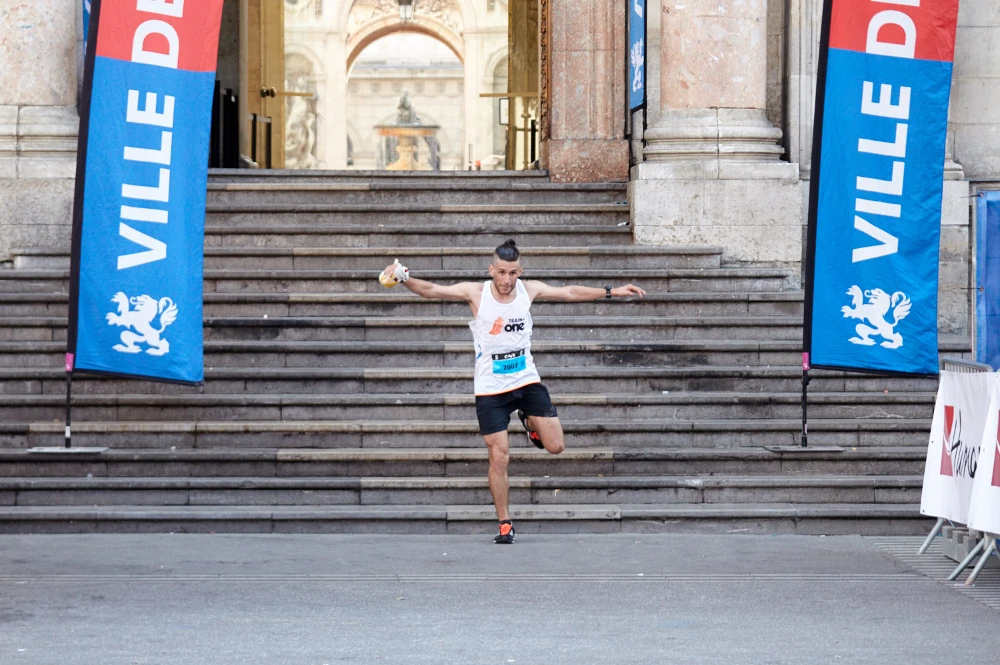
There are no details that are too small for a 24-hour race or a 100-mile race. If you can deal with it before the race and make it as easy as possible then do. Running 100 miles is tough enough as it is. Don't make it any harder.
A lot of people say stuff like, "Oh, I don't have a support crew", or, "I'm just gonna wear these old shoes because I'm tough. I'm tougher than you."
No, you're not tougher. You're stupid!
It doesn't mean you're tougher because you don't prepare beforehand.
Well done on those turning up at the start line injured and running, but if somebody turns up uninjured and beats you then what were you trying to achieve from that? It's a race. You're meant to beat other people.
rb: What other mistakes do people make?
bp: There are so many mistakes you can make. For me, one of the biggest mistakes people make is running too much.
People have this idea that because they need to race a 100-miler that they've gotta train 100 miles a week. But there's only so much that the body can take. Actually, the training for a marathon and the training for a 100-mile race don’t need to look too different.
So people do loads of training. You ask them on the start line how they are and they say, "Oh, my ankles are sore, my knee hurts, muscles are all tight." They get to 50 miles and they have to stop.
“If you get dehydrated it doesn't matter how much or how little you're carrying, or how fast you're going, you're going to fall apart.”
The other thing people get wrong is nutrition. People underestimate it. They think, "Right, I've got a carbohydrate store. I'll deplete that over the first three hours and then I'll start fuelling."
You think, "Hold on a sec. That was your buffer against the abyss! That was to keep you safe and you've just depleted it." You have to start eating straight away.
And people don't plan. By planning you can avoid lots of unnecessary stress and issues during the race. Don't make 100 miles more difficult. It's difficult enough already.
You can plan so much for a 100-miler. You can check the weather, you can check the shoes, what's underfoot, what food is available at checkpoints, how far between water points.
All these little things help. For example, maybe you find out there's a water point every five miles so you can carry a litre less water. Or maybe you find that it's twenty miles between checkpoints so you have to carry an extra 2-3 litres.
That makes a big difference. If you get dehydrated it doesn't matter how much or how little you're carrying, or how fast you're going, you're going to fall apart.
I love the planning part of it. In all other aspects of my life I'm not very meticulous, I'm quite disorganised, but with running I am. It piques my interest.
rb: And that can give you a big advantage over those who aren't prepared. Is it easy to find out all the information you need on terrain, elevation, checkpoints and so on?
bp: Depends. You can ask people who've done the race before. Whether they're honest with you is another question.
It depends how much effort you want to put into it. That's what we're doing in Chamonix. We want to know every part of that course. In the next ten years I want to do extremely well at that race. I want to know every single centimetre of that course. Even now I could probably walk you through 98% of it and explain it turn for turn in detail. And that's just from learning to love it.
I take my inspiration from the film Cool Runnings where they're planning to bobsleigh and they're looking at every bend. I remember hearing a few years ago about an American runner Nickademus Hollon who ran Tor des Geants out in Italy. He can tell you all the climbs. In a 200-mile race!
That changed my perspective. I think if you want to win, why would you not know every climb? If you've got a year to plan then why wouldn't you learn as much as possible?
rb: Do you plan sleep as well? In the week or so before a race what's the approach?
bp: It depends a lot on the start time of the race. Usually I'll try and get some extra hours in the bank the week before the race.
The races usually start about midday or ten in the morning, so you usually just have a relaxed morning. Have a saunter down to the track. Just be as relaxed as possible before the race starts.
The West Highland Way race starts at one in the morning. That was a weird one for me because I ended up staying up the whole Friday beforehand, then of course I was awake for 30 odd hours doing the race. And Paul Giblin, who beat me – I finished 2nd – had rested. He had a good four or five hours sleep. I think it was his fifth race and my first one. You learn quite a bit in your first few races. He also beat me because he was the better runner on the day but more sleep might have made it closer.
rb: So you learn by doing?
“Running for 10 years doesn't make you experienced. Learning from something for 10 years does.”
bp: Yep, especially in my ultra running. I'm still considered a youngster in ultra running, and people sometimes think, "What does he know?" The thing is running for 10 years doesn't make you experienced. Learning from something for 10 years does.
Some of these guys have been doing it for 10 years and they're just hammering their head against a wall for 10 years. You have these crazy conversations:
"What's your nutrition plan like?" - "Oh, I don't worry, I just go and smash it."
"How do you pace?" - "I don't, I just got out and run as hard as I can for as long as I can."
"How is that working out?" - "Oh, I'm still running the same times as I was 10 years ago. But I'm experienced..."
No, you're not experienced You're a fucking moron who's been doing the same thing for 10 years.
I think a bit too much praise goes around these days. Someone'll enter a 24-hour race and drop out after 12 hours and everyone'll be consoling them by saying at least they made it to 12 hours.
Actually, its a 24-hour race and you're only half way. You don't get praise for running one lap of an 800 metre event?!
I mean, I'm not as blunt as that, but you have to be honest with people
rb: How about preparation on the day? Is there such a thing as a warm up for an ultra?
bp: I don't personally do a warm up, I just start the race a bit easier. However, at the World Champs a couple of years ago I ended up having to walk a couple of miles to the track cos we cocked up the taxi, so that was my warm up, a two-mile walk with my bag and all my food and so on, looking for a taxi with no cash. Great preparation. I suppose as a percentage of the race distance it's not too bad.
rb: For the actual race do you set off at a certain pace, or do you see how you feel on the day? Does it ever vary depending on who else is around?
bp: You make your decision before race day about what you're going to target. If somebody turns up at a 24-hour race and runs 290 kilometres then good on them. If someone's having that once-in-a-lifetime run that day, there's nothing you can do about that. You've got to accept that. You can't race a 24-hour race from the start.
There'll be someone who sets off at 6-minute mile pace and has no chance of even finishing. You'll ask yourself what he knows that you don't know and then 2 hours later you'll see him on his back.
You've really gotta run your own race. In the last four hours or so you can start thinking about other people.
You might be going well and then the wind picks up, or it's hotter than expected. There might be some issue that you have to deal with. Be comfortable for the first 20 hours and eat and drink sensibly the whole way through, then you can go wild in the last four hours and see what happens.
rb: What do you do when things go wrong?
bp: It depends. If it's a 24-hour race and you've got a crew then you'd just stop and change your shoes, change your socks, stick some Vaseline on. If you can change it then great.
With stuff that tends to happen early on in races hopefully you've weeded that out in training. To me a long run is a damaging thing, so you may as well make it as beneficial as possible. Try different shoes and try different kit. Try different scenarios. Sometimes you get a pair of shoes that are fantastic on the flat, but as soon as you descend in them they tear your feet to pieces, so they're not fit for task.
You experiment with as many different things as you can in training so that when it comes to it you avoid these issues, and if it does go wrong you're ready as you can be.
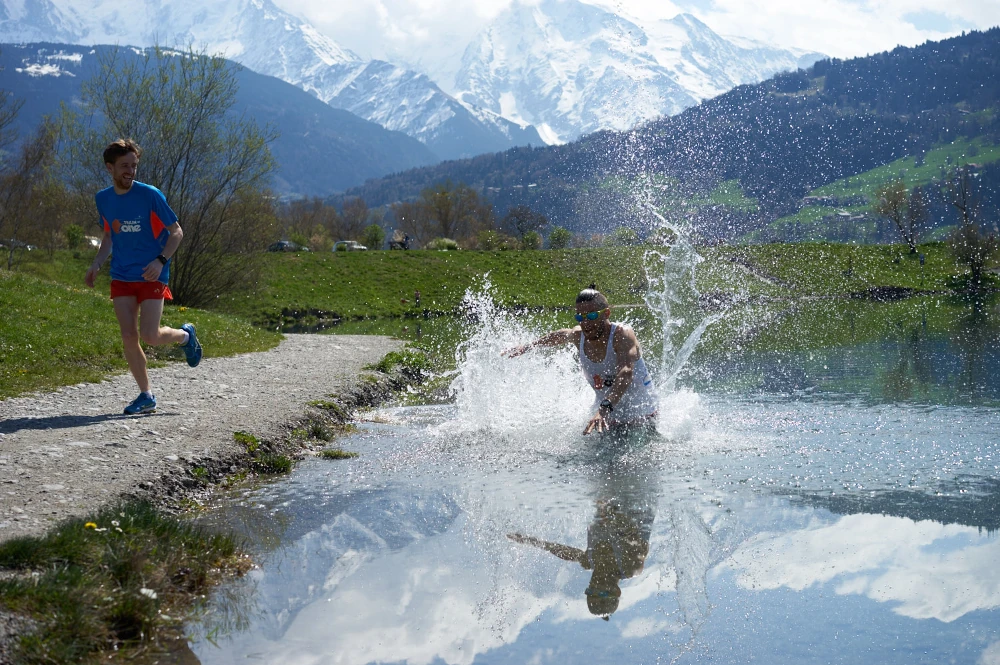
The thing is, the mind copes better with recurring pain. If your toe's hurting and it's a persistent dull pain you can block it out and get through it. But say you twist an ankle and there's a sharp pain every five or six steps, that's a lot harder to deal with.
So, if I'm in an ultra and I had a toe that was hurting I would try and mentally block it out and focus on other things, like my gait. Not necessarily change my gait, but just focus on it and make sure it's all going well.
I remember I was doing the Transvulcania race in La Palma and there's a 2,500 metre descent over 18 kilometres, and I'm bombing it down, loving it. Then I went over on my ankle, and I think every couple of minutes it twisted again.
And I've got another hour of going downhill and it's all cobbles and loose rock and stuff like that. One of the coping mechanisms was shouting out loud and swearing to myself when nobody else was around. You develop coping mechanisms. The only way to get down that hill was to run down the hill, so there was no point hanging around.
rb: It sounds like a bit of the appeal for you is the mental challenge. Having to be mentally tough and finding ways to deal with things.
bp: People ask why I like ultra running, and one of the reasons is that I'm good at it. It turns out I have this ability to run a long way slowly. I do enjoy the mental part of it.
“Stuff will go wrong in an ultra. In the best races I've done I've had low points”
I think mental toughness is something I deal with well. I rationalise a lot of the things. I can deal with a lot of issues on the road, and nothing really phases me.
Throughout life I'm always looking for the positives of the situation, and if you take that attitude into an ultra marathon it helps you work. Stuff will go wrong in an ultra. You always have low points. In the best races I've done I've had low points.
It is a challenge, but part of me doesn't see it as much of a challenge because I know I can cope with it.
I like the 800m reps, the fast stuff in training. I love trying to get faster and maybe if I was a bit faster I'd be a 10k runner, but to me the toughest race you can do mentally should be an 800m race. It's like Guy Learmonth said in his interview.
A friend of mine, fellow North Norfolk Beach runner Andy Kett, who was a decent 800m runner said he loved the race, but going into the home straight he started dreading the finish becasue he knew how that would feel.
For me, the mental side of a 100-miler is actually sort of enjoyable. But the pain you have to go through in an 800 metres, I find that interesting. Mentally for that you have to switch something off and I'd love to have that switch and I keep searching for it.
rb: So you do do speed sessions?
bp: I've gone as low as 300s. I did 6 x 300m. That was a a bloody hard session as well!
I might do 1k reps. It depends on the phase of my training. I like to periodise quite a lot. One piece of advice I took from one of the American coaches is the further out from a race you are the further from race pace you should be.
So if I'm training for a 100-miler I'll always start with a block of shorter faster stuff. I love it. That's another benefit to training like that. Variety and enjoyment.
I think there are definitely benefits for ultra runners getting speedier. If you improve your speed it makes your easy running easier. People'll say when you coach them, "I'm doing less miles and I'm feeling fitter." The majority of people I'm coaching I get to do less and add more variety, because they've been doing all their training at one pace.
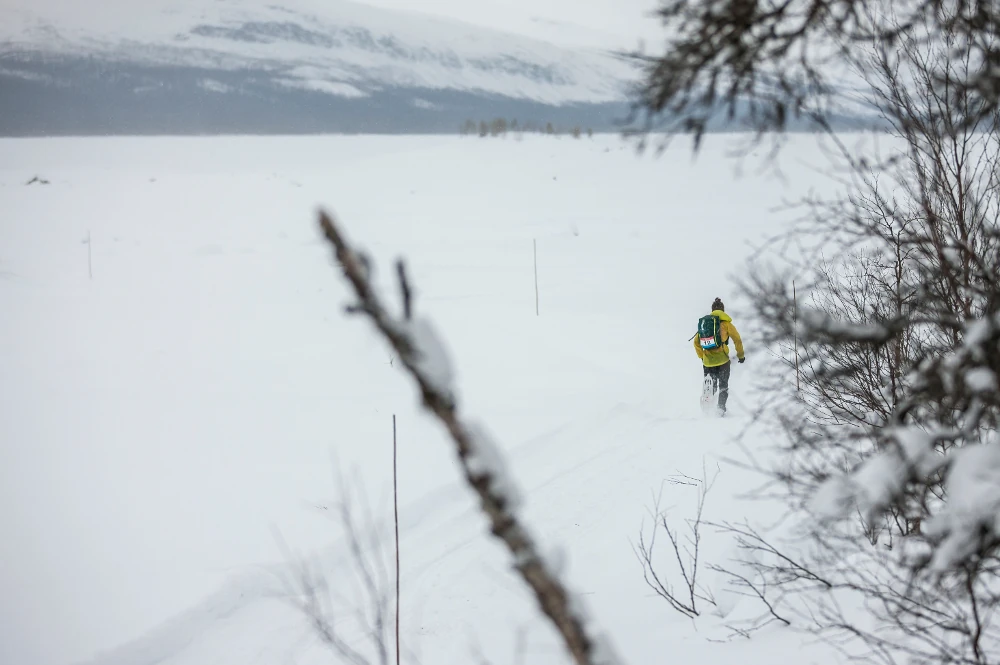
I did a group hill session on Box Hill recently. I started with a warm up and drills, and none of them have done drills before. They say they normally just go straight into hill sprints, then they'll tell you they pulled their hamstring on the third rep.
Then I'll get them doing 10-second sprints, and I guarantee, apart from the two guys there that I coach, none of them have done that before.
That'll have a massive benefit for guys that haven't done it before. All of them will be feeling it the day after.
The thing is there's so much to enjoy about shorter running as well. I'm trying to improve my speed now. I'm still working on my 5k and 10k time, and one of my big aims before the World's next year is a 10k PB.
rb: What's the shortest you've ever raced?
bp: Since I've been racing, probably 3k. And then in that race I ended up racing tactically because there was a 5k specialist in that race. So I sat on his shoulder and sprinted past him at the finish, which was a shock to all of us.
I'd love to do an 800m race. I really would. Just to see what happens.
rb: Different distances can change your perspective.
bp: Yep, you can apply that logic to ultra running. If you can survive the pain of an 800m, or a 5k, in an ultra you're never going as hard as that.
It's a different type of pain and suffering and toughness, but it's great to understand the range of agony as a runner.
To have that in your thought process. When you're thinking, "I'm working hard here", you can tell yourself it's not that bad. At least you're not in an 800 metre race, you're just taking it easy for 12 hours.
rb: Do you dread any particular parts of ultras? For example, is mile 38 always horrible in a 50-miler?
bp: Nah, I love it. Even the tough bits that everybody struggles with, I enjoy. I see it as an opportunity.
In any race, around 15-20 miles it starts feeling tough and people get shocked by that. They start worrying they won't make it to 100 miles because their legs are tired after 20 miles.
But your legs are tired because you've done 20 miles. Of course they're going to be. They're not gonna get five times as tired by 100 miles. It's not a cumulative thing. Well, it is a little bit, but it's not directly proportional to the distance done.
“It's not about going well when you feel good. It's about going well when you feel like dog shit”
The way I look at it is as a challenge: I'm gonna suffer a little bit less, I'm gonna do a little bit better.
That opportunity comes from the harder moments. I say it's easy to run well in a 24-hour race or a 100-miler when you're going well and you're feeling great. Anyone can do that. You win them by making the most of things when you feel awful.
Everyone's gonna feel bad in a 24-hour race. Everyone has low points where you've just gotta push through. And if you stop and sit down and give up, slow down to a walk, then people'll beat you. You'll lose.
In the World Champs there are people in that field who can run well under 2:20 for a marathon. To a lot of these guys the first 20 miles are easy. They could go a lot quicker, but it's not about going well when you feel good. It's about going well when you feel like dog shit. To me that's one of the more important bits. It's where I excel.
rb: Is ultra running contagious? Are ultras really getting more popular?
bp: It's definitely becoming more popular. But it's not growing at the rate that people might believe.
When an article appears in a running magazine we probably get an unfair proportion of media visibility because it's more appealing and more readable for many.
I'm a fan of running and love watching 800s and 1500s for example, but your average runner isn't so interested. For that reason ultra running does get a bigger slice of media attention.
And with that, it shows people that there are people like me, people like Steve Way, that you read about and you think, "Actually, these are just normal blokes. They're a bit weird, but they're reasonably normal. Maybe I can do this."
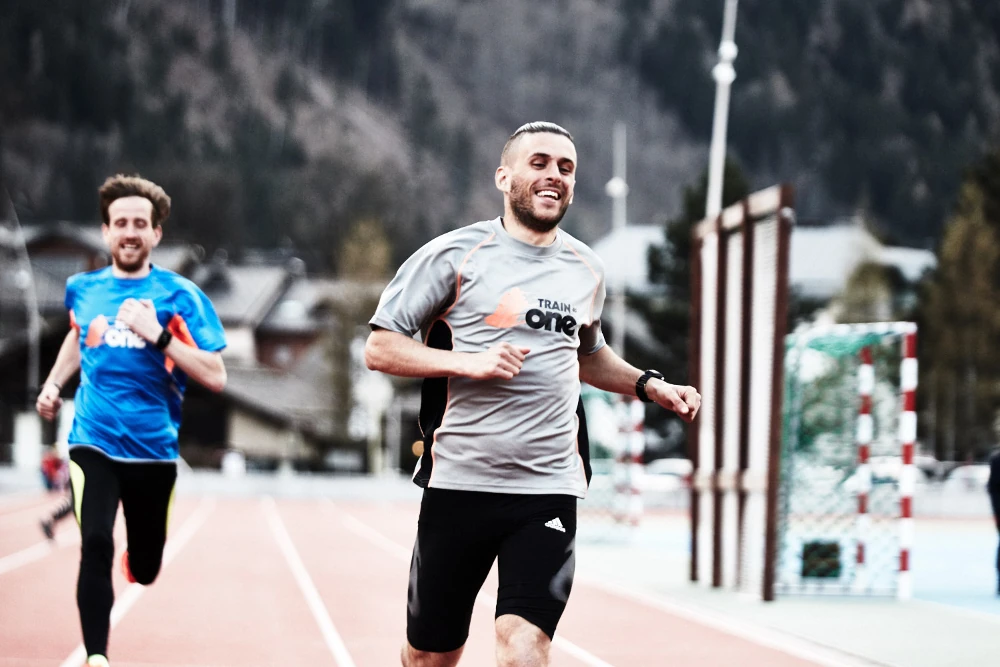
That makes it seem more achievable. People see a guy who's done a marathon with a friend, then done a 56-miler, and then eventually ended up building his life around it.
That's one of the things I like doing. Letting people know that it's not a super-human task.
If you and I had to go out tomorrow and move 100 miles or we'd get shot, we'd do it. It'd hurt and it wouldn't be pretty, but you'd do it. You'd get there.
The training part of it is just getting as physically fit as possible and making it as easy as possible.
There are very few people in the population that couldn't move 100 miles. You take the most unfit, obese person, it might take them a year to get there, but they could do it. A lot of it is finding the pace that works for you.
rb: Makes you think! So, there is one final question that we ask all our interviewees, and that is, if you could race against, and beat, any athlete from any era in any race. Who, when, where, what would it be?
bp: Aah, there are so many.
One at Western States. There's a video about it called "Unbreakable" and there's four guys at the front. You think you know who's gonna win and then in the last 5k the lead changes.
I'd love to have been involved with that. Just to able to keep up with them as well. I love a competition, so any great race like that.
Oh, there's another one. It's on the Road Runners Club web site. There's a PDF about it. ( see here ) It's the greatest 100 mile race ever.
There's 12 blokes under 16 hours. Cavin Woodward broke the 50 mile world record and the 100km world record on the way to breaking the 100 mile world record. He ran under 5 hours for 50 miles and 11 hours 39 for 100 miles. He slowed down a fair bit, but he broke the record for both.
But I think I would maybe say Yiannis Kouros at the height of this powers. I've raced him at the age of 60 and I just about beat him. I'd love to have been there when he was at his best running 300 km in 24 hours.
300km in one day. One day! It's ridiculous!
rb: And you'll beat him by how much?
bp: Five metres. I want a sprint finish!
It does happen. Last year in Turin I was 40 metres behind second place. We were both flat-out sprinting. I was gaining. I needed 24 hours and 2-minutes and I woulda beat him.
rb: Your wish is granted.
Robbie, it's been really interesting talking to you and good luck with the knee. We'll be keeping a close eye on the World Champs in Belfast this summer.
Robbie has a website and blog and you can keep up with him on Twitter.